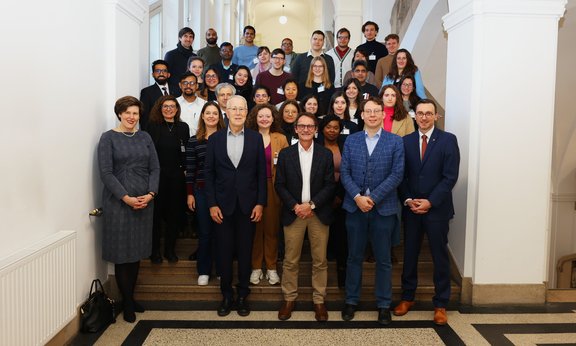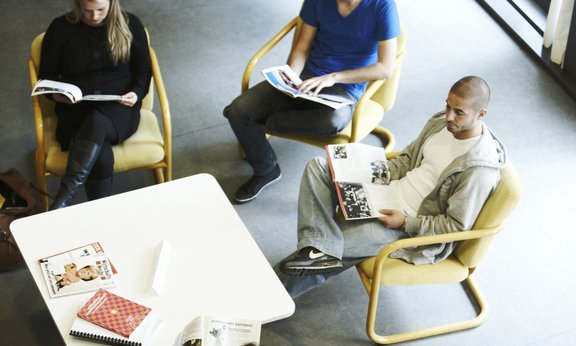Master's Programme Media, Society and Communication
Are you interested in the influence of digital platforms and networks on our society?
The English-language Master's programme Media, Society and Communication provides an understanding of digital platforms, networks and infrastructures as well as processes of digitalisation and datafication (including data analysis and data criticism). It is about their use, media practices and interaction contexts as well as their effects on society, organisations, institutions and companies. Thematic foci are on emerging media, media dynamics and sustainability as well as digital democracy and society.
Study code
UC 066 579
FAQ
The Master's programme provides practically relevant knowledge about the use of digital platforms, networks and infrastructures as well as about processes of digitalisation and datafication. Students learn how to conduct data analysis and data critique and how to apply this knowledge in different contexts.
Using an interdisciplinary approach, students develop an understanding of the role of media in society and in different industries.
Graduates will have an understanding of the dynamics of digitalisation and the challenges it poses in society, politics, business, public administration, culture and everyday life. With a view to the dynamics of media and communication as well as societal changes, they are able to deal with social, cultural, political and technical functions of the media as well as questions of sustainability and diversity in an independent, critical and differentiated manner.
The Media, Society and Communication degree programme focuses on dynamic media change and emerging media. Students should be able to understand the effects of the transformation processes brought about by media technologies on society and the media landscape.
The ability to understand and design digital communication and interaction is also an important component of the degree programme. So is technology development and the shaping of future social processes.
Graduates of the Master's programme Media, Society and Communication have a wide range of career opportunities in various fields. They can work in media companies, publishing houses, agencies or public institutions. Possible career fields include media management, corporate communication, public relations, marketing, social media management, journalism, research and teaching as well as NGOs and international organisations.
Graduates can plan and implement communication strategies and marketing campaigns and develop digital media products and services. In academia, graduates can work as researchers in the field of media and communication. Through their interdisciplinary education, graduates are able to understand and analyse the impact of digital technologies and the social changes that accompany them.
Graduates tracking: Shows which occupational fields students can enter after graduation.
Doctoral Programmes
More offers
The Department for Media, Society and Communication has collected further frequently asked questions about the English-language Master's programme Media, Society and Communication on the Department's website.
Faculty of Social and Political Sciences Examination Office Information for students with disabilities
Why study Media, Society and Communication in Innsbruck?
„Do you want to learn about the impact of media on society? How will the future of communication look like?“
– Marcel Uitz
„Studying the Master Media, Society and Communication at Innsbruck University will make you an expert in evaluating, analyzing and investigating media dynamics.“
– Kathrin Jarosik
„Learn about emerging media, digital research methods and data politics.“
– Madeleine Kaiserer
Curriculum
From the field

„Winter School on Federalism and Governance“ in 15. Runde
29 postgradual Studierende und Nachwuchsforschende aus Afrika, Amerika, Asien und Europa nehmen derzeit an der 14. Winter School on Federalism and Governance teil, die sich – ganz im Einklang mit dem Querschnittsthema „Nachhaltigkeit“ an der Universität Innsbruck - dieses Jahr dem Thema „Federalism and Sustainability“ widmet und unter der Schirmherrschaft des Europarats steht.

FWF fördert 6 Projekte
Bei der FWF-Kuratoriumssitzung im März wurden vier Einzelprojekte und zwei Esprit-Projekte von Wissenschaftler:innen der Universität Innsbruck bewilligt.

Marianne-Barcal-Preis 2023 vergeben
Seit acht Jahren wird der Marianne-Barcal-Preis jedes Jahr an Studierende der Universität Innsbruck verliehen, die sich durch hervorragende Abschlussarbeiten in den Fächern Zeitgeschichte, Politikwissenschaften, Geschichte sowie benachbarte Disziplinen ausgezeichnet haben. 2024 geht der Preis an drei Wissenschafter zu je 2.000 Euro Preisgeld.

Madagaskar, Medien und Außenpolitik im Wald
Studieren ist mehr als Zuhören im Hörsaal: Student:innen gestalten Podcasts, fahren nach Madagaskar auf Exkursion, treffen Medienschaffende und helfen, die Leistungen des Waldes zu erhalten.


















